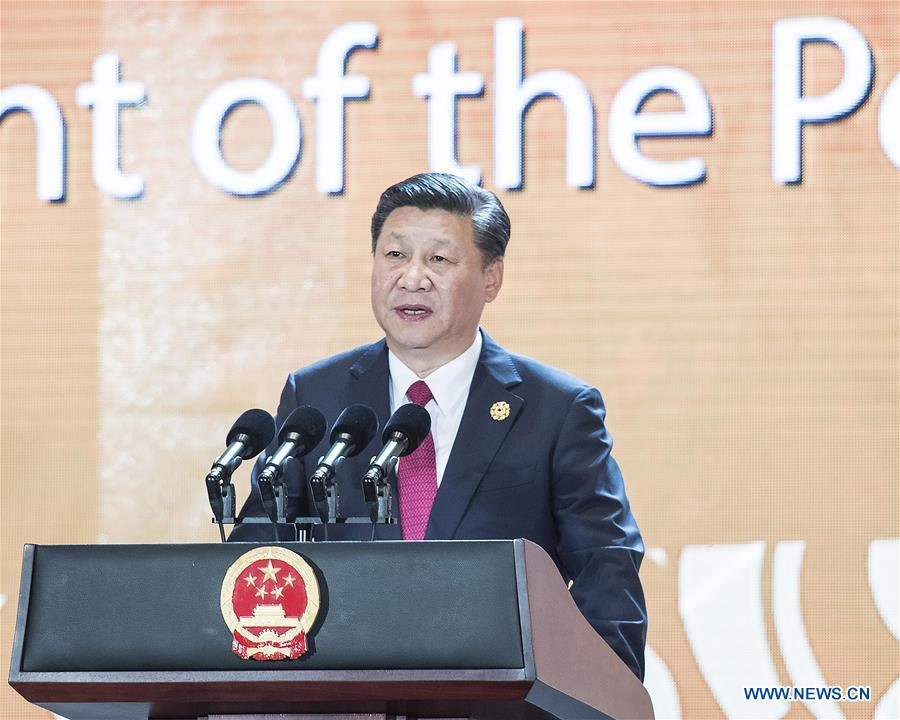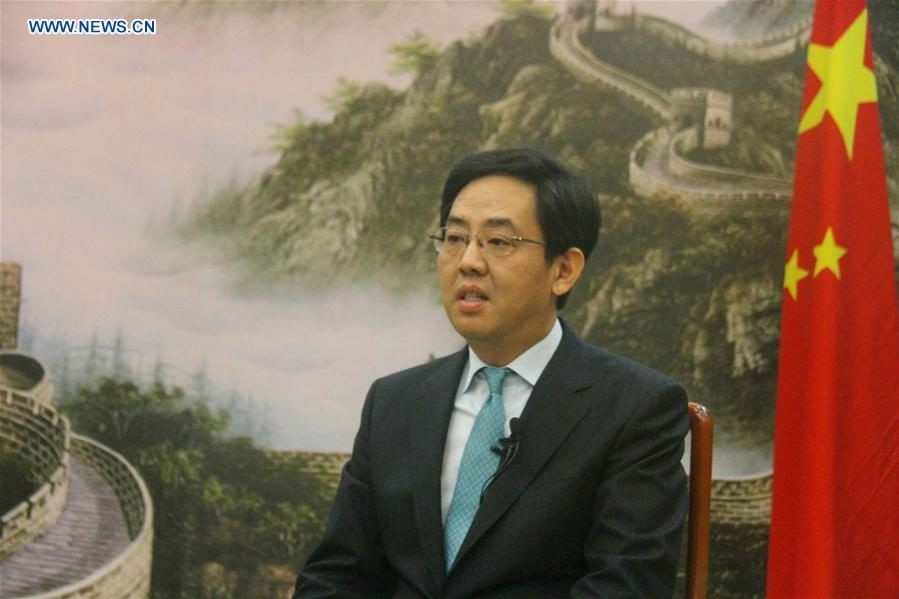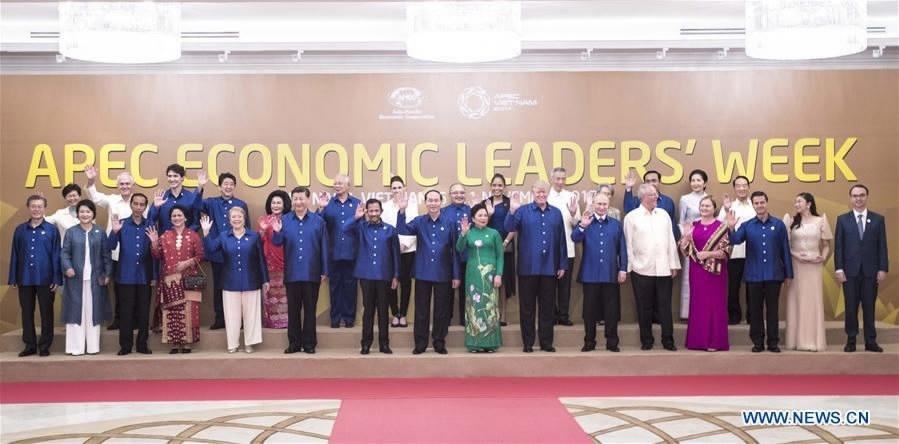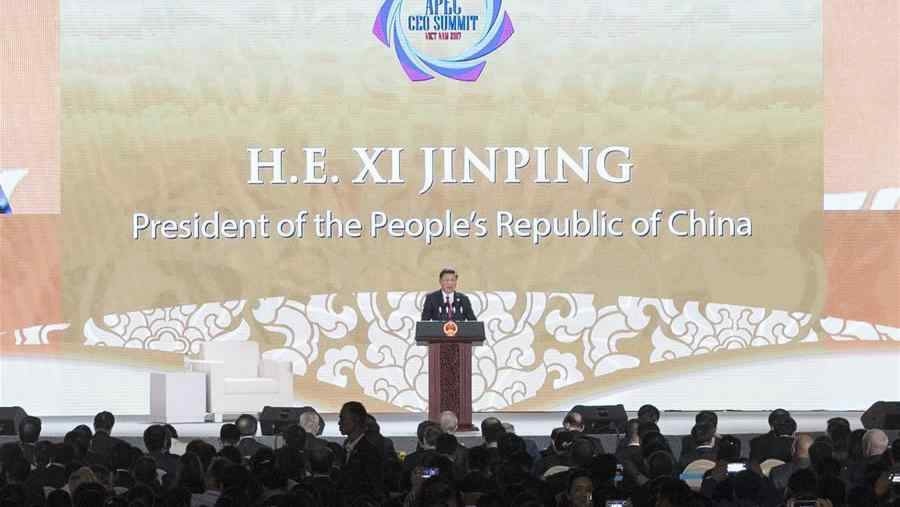On November 10, Chinese President Xi Jinping delivered a keynote speech titled “Seizing the Opportunity of a Global Economy in Transition and Accelerating Development of the Asia-Pacific” at the Asia-Pacific Economic Cooperation (APEC) CEO Summit in Da Nang, Vietnam.
As Xi stressed, the world is facing the momentum of new economic growth, the new mode of global development, the new process of economic globalization and the profound transformation of the global economic governance system.
The Asia-Pacific region as the largest sector of the global economy and a major engine of economic growth in the world must gain insight into the trend of world economic development, pinpoint its position, grasp the law (of economic development) and resolutely respond to the profound changes in the world economy.

Chinese President Xi Jinping delivers a keynote speech at the Asia-Pacific Economic Cooperation (APEC) CEO Summit in Da Nang, Vietnam, Nov. 10, 2017. /Xinhua Photo
Chinese President Xi Jinping delivers a keynote speech at the Asia-Pacific Economic Cooperation (APEC) CEO Summit in Da Nang, Vietnam, Nov. 10, 2017. /Xinhua Photo
Xi’s keynote speech was warmly welcomed by long applause from the representative leaders of APEC members. As Chinese Ambassador to Vietnam Hong Xiaoyong commented during an interview in Hanoi, President Xi Jinping’s participation in APEC and state visit to Vietnam have shown the world a rich content of neighborhood diplomacy with Chinese characteristics in the new era.
Xi’s words not only answered the call of the theme “Building New Motivation and Creating a Shared Future” this year, but also pointed out a clear way of international collective cooperation.

Chinese Ambassador to Vietnam Hong Xiaoyong speaks during an interview with Xinhua in Hanoi, capital of Vietnam, Oct. 31, 2017. Chinese PresidentXi Jinping's upcoming participation of the 25th APEC Economic Leaders' Meeting and state visit to Vietnam will show the world the rich content of neighborhood diplomacy with Chinese characteristics in the new era, Hong Xiaoyong told Xinhua. /Xinhua Photo
Chinese Ambassador to Vietnam Hong Xiaoyong speaks during an interview with Xinhua in Hanoi, capital of Vietnam, Oct. 31, 2017. Chinese PresidentXi Jinping's upcoming participation of the 25th APEC Economic Leaders' Meeting and state visit to Vietnam will show the world the rich content of neighborhood diplomacy with Chinese characteristics in the new era, Hong Xiaoyong told Xinhua. /Xinhua Photo
At present, economic globalization is at a vital juncture, which originated in the 1970s, brought great economic development while at the same time brought about major problems such as unbalanced development among countries, unbalanced economic and social development among different social class or groups within a country, as well as unbalanced development between virtual economy and real economy. In sum, a series of issues have become increasingly prominent.
With the accumulation of problems above, especially the continuing manifestation of the deep-seated effects of the international financial crisis, protectionism, xenophobia and populism have risen in major Western countries during recent years.
As a result, the process of economic globalization has suffered a strong “headwind” - scholars call it anti, reversal or/and de-globalization.

Chinese President Xi Jinping (6th L, front) poses for a family photo before a gala dinner hosted by Vietnamese President Tran Dai Quang and his wife for leaders, delegates and spouses attending the 25th Asia-Pacific Economic Cooperation (APEC) Economic Leaders' Meeting, in Da Nang, Vietnam, Nov. 10, 2017. /Xinhua Photo
Chinese President Xi Jinping (6th L, front) poses for a family photo before a gala dinner hosted by Vietnamese President Tran Dai Quang and his wife for leaders, delegates and spouses attending the 25th Asia-Pacific Economic Cooperation (APEC) Economic Leaders' Meeting, in Da Nang, Vietnam, Nov. 10, 2017. /Xinhua Photo
As the most influential cross-regional economic cooperation forum, APEC includes a number of panels covering a series of most heated topics, including but not limited to: sustainable development, green agriculture and food safety, innovative growth, inclusive economy, regional economic integration, the competitiveness and innovation of SMEs, and so forth.
Participants also united to go against the rising trend of trade protectionism, isolationism and the uncertainties caused by them. That is why President Xi’s words have won so much applause and concern – the world facing serious problems need a responsible leader to shoulder the heavy burden, give hopes and unite all other states together for cooperation.
Since joining APEC in 1991, China has been an important supporter, participant and contributor to this mechanism. Since October 2013, when President Xi Jinping first attended APEC as Chinese leader, he has generated a series of key concepts and ideas for this growing forum, such as ‘inclusive globalization’, ‘open-style economic development’ and so on.
This year, China has passed the 19th National Congress of the Communist Party of China and entered a ‘new era’, so will be the APEC, which may play an increasingly significant role in the post-crisis era and contribute to construct a more fair, equal and mutually beneficial economic globalization.
(Wang Peng is a research fellow at the Charhar Institute and China Institute of Fudan University, Shanghai. His areas of research include CPC building, Chinese foreign policy and Asia-Pacific international security. His research interests now focus on comprehensive strategic interactions between China and its neighbors, as well as the influence of the Belt and Road Initiative. The article reflects the author’s opinion, and not necessarily the views of CGTN.)





